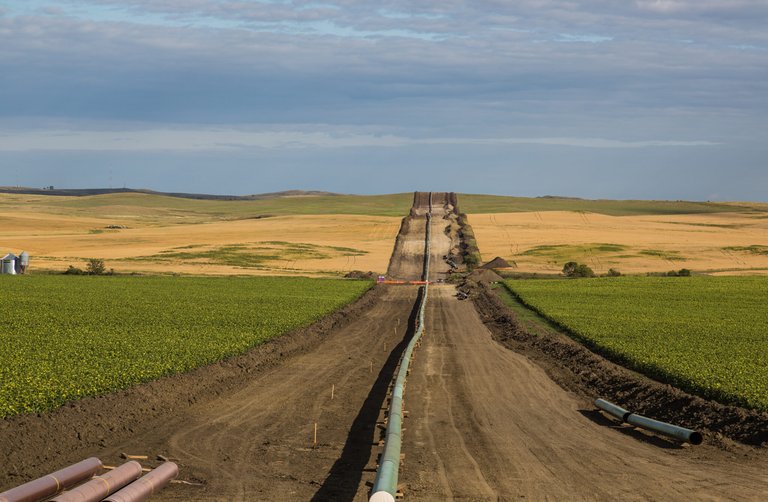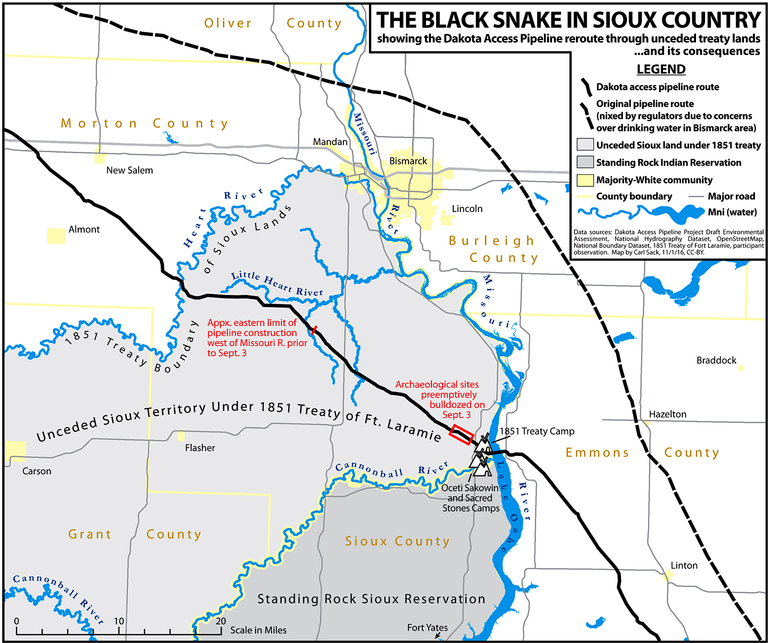
After five years of opposition from indigenous peoples and environmentalists against the Dakota Access Pipeline (DAPL), a pipeline that runs from North Dakota to Illinois, a federal judge ordered the pipeline to be shut down by Aug. 5. The protest was violently repressed in the states involved, criminalized with strict repression laws, and largely ignored by the mainstream media. A historic victory, but the battle is not over.

After five years of legal proceedings, a verdict has been reached in the case of two indigenous peoples, the Standing Rock Sioux and the Cheyenne River Sioux, along with several environmental activists and organizations. The claimants sought to close the Dakota Access Pipeline that transports crude oil from North Dakota to a terminal in Illinois.
They consider this pipeline to be a major threat to their groundwater and to the waters of the Missouri. The Missouri, along with the Mississippi, is the fourth-longest river in the world. It crosses the entire US from across the Canadian border to the Gulf of Mexico. Experience with other pipelines shows that these pipelines to reduce costs are never built safely and that the oil companies involved calculate future leaks into their running costs.
This pipeline was originally planned through a different route. However, the idea was quickly discarded because it traversed urban residential areas of white Americans. The pipeline company was relying on low opposition from the sparsely populated area more to the east of the original route.
Resistance exceeds expectations
Against all odds, opposition against the pipeline under the hashtag #NODAPL (No Dakota Access Pipeline) has grown into the biggest manifestation of indigenous peoples since the 1960s. The South Dakota state government mobilized major resources, including private security companies with dogs and tear gas, which turned out not to have any mandate for public order enforcement. During the months of occupying the pipeline construction route, infiltrators were also paid to incite activists to commit violent crimes, attacks, and provoke the police.
The Congress of South Dakota and Iowa also passed anti-protest bills criminalizing people’s right to protest. This law enables officials to prohibit protests of more than 20 people on public lands in certain circumstances and expands the crime of trespass. Despite opposition and an almost complete boycott by the US mainstream media, thousands of activists nevertheless continued to gather in camps around the pipeline trajectory. Several activists are still waiting for a final verdict based on these laws, some of them risk decades of imprisonment.
Obama denied permits, Trump approves again
Ultimately, President Obama decided in late 2016, shortly before his departure, to deny permits for DAPL to cross the river. One of President Trump's first decisions after taking his oath was reversing that decision, along with a commitment to invest even more in new fossil fuel pipelines. Since then, the pipeline has been in operation for three years. As predicted, several leaks have already occurred over the entire stretch, resulting in serious environmental damage.

The peoples and environmental organizations involved have not only taken action on the ground. They investigated the conditions that were officially linked to the building permit. They learned - not to their surprise - that the local authorities made no effort to check whether those conditions were being met. This was nothing new for the native peoples on the ground.
The history of their oppression by the European settlers was a relentless repetition of violated treaties and agreements, repression and mass murder, expropriation, the kidnapping of children to white boarding schools... Today, discrimination against indigenous peoples in the US and Canada is less brutal, less overt, but their socio-economic discrimination is still the norm ... The violation of legal requirements for construction works for mining and forestry companies is countless.
A violation against the National Environmental Policy Act
The federal judge ruled that the US Army Corps of Engineers had violated the National Environment Policy Act when approving federal permits for DAPL. The Corps is expected to finish its full court-ordered Environmental Impact Statement (EIS) for the pipeline by mid-2021.
The illegality of the building permit had already been spoken out in court in March, but now the judge has imposed the conditions that the permit must meet in order to be accepted again. It is therefore still possible that the pipeline may open again within a year. The activists therefore also count on the cold-hearted reasoning of investors, who consider these pipelines a too risky undertaking for the future.
After all, there are already other projects where this consideration has been made. A day before the verdict against the Dakota Access Pipeline, two energy companies cancelled the Atlantic Coast Pipeline (ACP) that would have transported fracked gas through West Virginia, Virginia, and North Carolina. According to environmentalists, this decision is a result of the continued fight against the Dakota Access Pipeline.
The campaign to stop the Dakota Access pipeline, led by Indigenous groups whose water would have been directly impacted by that filthy project, inspired and emboldened climate activists across the country. The Trump White House can boast and bluster all it wants, and corporate behemoths can scheme to take advantage of the administration’s fondness for fossil fuels, but they are no match for determined grassroots opposition movements fighting for environmental justice and an end to the degradation of our air, water and climate. - Food & Water Action policy director Mitch Jones
Today’s ruling—arriving on the heels of the Atlantic Coast Pipeline victory—may be a calamity for oil and gas executives looking to profit from the disastrous climate crisis, but it’s a huge win for those of us committed to a livable world. A just transition to renewable energy is not only the future, it is the only responsible choice for today. - Greenpeace USA climate director Janet Redman

Sources:
- Tribes Celebrate Court-Ordered Shutdown of Pipeline
- Greenpeace Celebrates Dakota Access Pipeline Shutdown
- ‘Huge Victory’ for Standing Rock Sioux Tribe as Federal Court Rules DAPL Permits Violated Law
- For Their Efforts to ‘Save Our Planet,’ Dakota Access Pipeline Opponents Face More Than 100 Years in Prison
- “A Dream That Comes True”: Standing Rock Elder Hails Order to Shut Down DAPL After Years of Protest
- How Black & Indigenous Groups Won the Fight to Stop the Atlantic Coast Pipeline
CONGRATULATIONS!! and thank you for creating wonderful, original content on Hive.
Please share and support our curation, and share some Hive-Love to the other posts selected too.
EARTH HEALING is a Natural Medicine project which supports the regeneration & healing of Mother Earth on HIVE